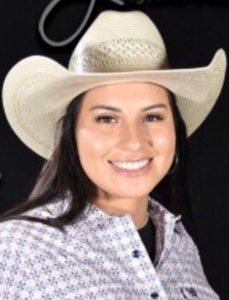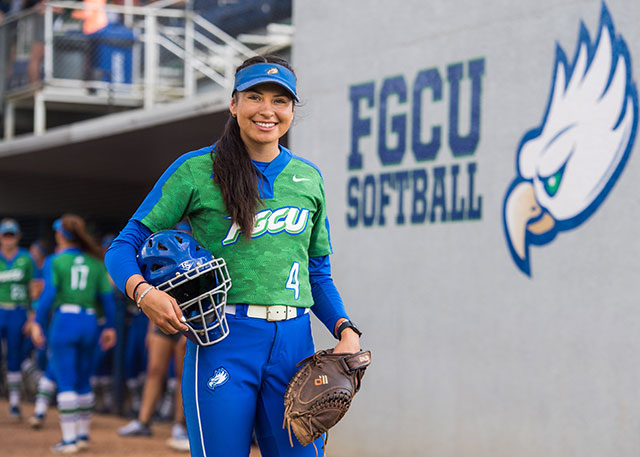You have to admire softball player Ahnie Jumper for becoming the first member of the Seminole Tribe of Florida to be a student-athlete at Florida Gulf Coast University, and one of few to play NCAA Division I sports.
A sophomore catcher with the Eagles, who host the ASUN Softball Championship Tournament May 8-11 as the No. 3 seed, Jumper also is to be admired for having the work ethic to do what it takes to be a competitive rodeo cowgirl while playing college softball and earning a degree in early childhood education. Rodeo is a tradition in her family from the Big Cypress Reservation near Clewiston in Hendry County, about an hour northeast of FGCU.

But you have to admire Jumper most of all for her career plan after graduating from FGCU: to return home to the reservation as a teacher dedicated to giving tribal children the best educational start in life that she can. It’s a noble ambition that follows in the tradition of — and would no doubt bring great pride to — her late great-grandmother, Betty Mae Tiger Jumper, a genuine Seminole pioneer as a cattle rancher and health-care advocate. Her elder also was the first and only woman to become chairwoman of the tribe, founded the tribe’s first newspaper and was the first Florida Seminole to learn how to read and write English, graduate from high school and become a nurse.
“My dad was really close to her … we visited her quite a bit over in Hollywood when she was still alive,” Jumper said. Her great-grandmother died in 2011.
Her love of rodeo — she does breakaway calf roping and barrel racing and was once crowned Eastern Indian Rodeo Association queen — comes from her father, a team roper who’s “really dedicated … practices every day” and still competes, as do Jumper’s two older brothers. “I’ll be doing rodeo all summer, including out in Oklahoma,” she said. Although she has been hurt a few times in the second sport that she said is “of course” tougher than softball, “That’s what my family does. Everybody but mom.”
Mom, on the other hand, is the person who inspired Jumper’s aspirations to be a teacher and taught her the value of education. Her mother, who runs the preschool in the Ahfachkee School (the “Happy School”) on the Big Cypress, was determined that her children would get a better education than what was offered on what Jumper calls “the rez.” Jumper fulfills her classroom teaching hours as part of her degree requirements at that school and at Immokalee High School.
“My mom is really big on education, and she home-schooled us before we went off the rez,” she said. “When I got far ahead of the other kids in my class, she made me go to American Heritage starting in fourth grade. I didn’t want to leave the rez, and I hated it. I had to get up three hours early, put on a uniform, take an hour drive and spend my days with people I didn’t know and who didn’t understand anything about me. But it was the best thing she has ever done for me. It made me grow up quite a bit. Once I got off the rez, believing I could go to college was easy.
“There are quite a few who never leave the rez … people I didn’t want to be like. I mean, I consider myself just an average person, and there are so many others there who could’ve really really made something of themselves, but didn’t. My mom taught me they can never take a good education away from you.”

And that’s where Jumper’s dream begins. “Someday, I even hope to get a doctorate in educational leadership, so I can get into a position in charge and put an education system on the rez that I think will work. But right now, after graduation, I just want to teach.”
Of course, there’s also a matter of playing college softball, too, which Jumper and her FGCU teammates will do for the final time at home this season when they host the ASUN Softball Championship Tournament, which takes place May 8-11 at the FGCU Softball Complex. The Eagles play No. 6 North Florida at 3 p.m. May 8 in their first-round game.
Jumper already is a role model on the softball field; she was the main attraction for about 35 young girls late last year at a softball clinic featuring FGCU teammates and assistant coaches on the Brighton Seminole Indian Reservation in northeast Glades County. But as far as her coach, FGCU softball coach David Deiros, is concerned, Jumper’s role-model status with younger players — and her peers — goes beyond a bright yellow ball, bat and glove.
“She’s a very intelligent, thoughtful, diverse and levelheaded young woman with a multitude of interests and a very clear view of what she wants to do with her future — to make sure everyone around her has better opportunities than she did,” said Deiros, who had followed Jumper’s progress as a high-school and travel-ball player with the Plantation-based Gold Coast Hurricanes. “She is part of the reservation cultivation process. She’s an amazing kid because she’s more grown up than most of the people around her. That’s what makes her special. She’s very mature. She grabs the bigger picture quicker and more completely than most of her peers.”
Jumper is a reserve catcher for the Eagles, but she has earned respect from her teammates, many of whom had never even met a Native American before. “I actually went around the locker room one day and asked them that, if I was the first one they’d known,” she said.
Her evolving role with the team reflects the respect she has earned. “She keeps growing, and her role will keep expanding” her final two years of eligibility, Deiros said. “She really understands the game and isn’t intimidated by tough situations. And she has taken the time to build a great relationship with each of our pitchers. They love her. She has a Nokona glove that really makes a loud pop when she receives a pitch, and I’ll tease the pitcher by saying, ‘Is that you … or Ahnie’s glove?’ And Ahnie will shoot back, ‘Coach, you are being disrespectful to my pitcher!’ ”
And Deiros doesn’t even mind that one of his players risks her athletic health almost every day by riding and roping from the top of rodeo horses — even during the spring season, when the coach says Jumper often goes immediately from softball practice to rodeo practice.
“As long as she’s not roping and tying me up in eight seconds or less, it’s OK with me,” Deiros said.